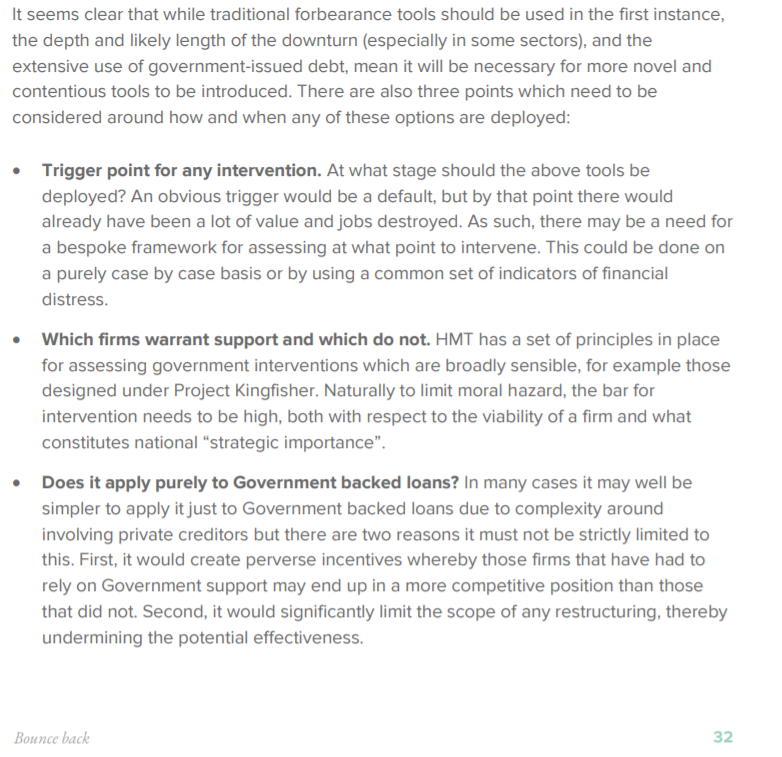As part of this paper I looked at the challenges posed for any economic recovery by the UK& #39;s corporate debt/leverage levels. A thread setting out why, if not handled correctly, this could hold back a recovery 1/ https://twitter.com/ukonward/status/1280018728734855170">https://twitter.com/ukonward/...
There is a global challenge on corporate indebtedness. Total non-financial corporate debt has reached $13.5trn & has “lower overall credit quality, higher payback
requirements...inferior covenant protection” compared to previous credit cycles according to OECD 2/
requirements...inferior covenant protection” compared to previous credit cycles according to OECD 2/
The UK doesn& #39;t look too bad by many metrics compared to its peers. But on average UK firms have 5th highest level of debt as a share of their operating surplus. And while their cost of debt servicing is not one of the highest, it is still on average 35% of income. 3/
Why is this a concern? First, there is a very real chance that the mix of falling asset prices, high debt levels & servicing costs as well as ongoing disruptions to demand create a & #39;balance sheet recession& #39; type scenario as seen in Japan in 1990s & US post 2008 4/
In this scenario we see firms prioritising deleveraging & saving over investing & maximising profits. This means cutting costs, often by cutting workers. But it also means holding back investment. This poisonous combination would seriously undermine an economic recovery 5/
Second, we could see creation of more zombie firms due to combo of economic disruption but lots of liquidity in the market. These firms reduce overall productivity in two ways. They tend to be less productive themselves. They also suck resources away from more productive firms 6/
Even before the crisis the number of zombie firms in the UK was at a historically high level of between 8% and 14%. Travel and leisure (12%), real estate (11%) and listed automotive firms (17%) have some of the highest rates - all sectors hit hard by the Covid-19 crisis 7/
Third, we could see significant defaults on Government backed loans. Recent survey by Business Banking Resolution Service found 43% of businesses who accessed these loans don& #39;t expect to repay. This stock of bad debt will need to managed to avoid being a drag on the recovery 8/
Of course, the impact of all this will not be uniform. Some sectors will be hit harder & the extent of the impact depends on the speed of the recovery. But there is clearly a very real chance that this debt overhang undermines the economic recovery in certain areas. 9/
What to do? Quick action is needed, ideally before we start to see significant cost cutting (large number of redundancies from firms). We set out a number of recommendations... 10/
1. Set up a temp restructuring agency similar to Japanese IROJ to help firms restructure their debt - through forbearance, debt for equity swaps, contingent tax liability (for small firms) or even write offs in extreme cases. Deciding who to help will be challenging... 11/
In particular, there will be capacity constraints due to the specific expertise needed. The agency should build this up & bring it together, particularly to help SMEs. This work should start now to ensure it is in place asap. 12/
2. The problem is not just existing debt but ensuring companies who want to invest/grow don& #39;t just have to take on ever more debt. This means increasing the options for equity financing. 13/
There is no shortage of capital, challenge is ensuring everyone can access it & on right terms/ in a form other than debt. Here the UK has institutions it can use already. British Business Bank & Business Growth Fund in particular should be boosted from current £10bn to £30bn 14/
3. Finally there should be a long term review of the tax treatment of debt & equity. There are interesting examples out there, such as notional interest deduction for equity in Belgium, which suggest addressing this can help reduce reliance on debt 15/ ENDS

 Read on Twitter
Read on Twitter



